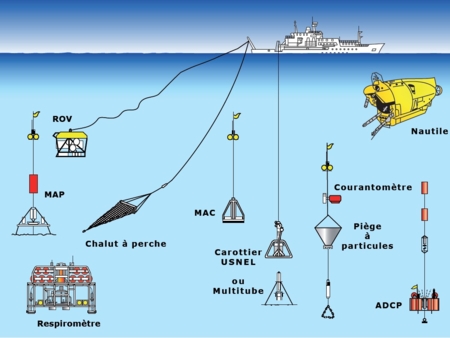Job position at BEEP: Researcher in biogeochemistry (M/F)
General areas of responsibility
Deep marine ecosystems host a high biological diversity resulting from the variability of benthic environments. The functioning and dynamics of these ecosystems in their natural state are still poorly known, yet they are of increasing interest for government and industries regarding the exploitation of their natural resources.
The UMR BEEP aims to study the biology and ecology of deep marine ecosystems using a multidisciplinary approach over a wide range of scales, from microorganisms to macrofauna, and from the molecule to the community. The main research objective is to describe biological diversity and its dynamics in relation to the heterogeneity of the environment at different spatial and temporal scales, regardless of the type of ecosystem considered. This objective has allowed for several years the development of research projects integrating, in a comparative approach, the different compartments (micro-organisms, meiofauna and macrofauna) of chemosynthetic, hard substratum or sedimentary ecosystems.
Main objectives
The research activities to be developed by the researcher will contribute to the acquisition and dissemination of knowledge on the physico-chemical functioning of deep marine habitats, by integrating chemical flux modeling methods, for the description and quantification of biogeochemical processes specific to each ecosystem.
The selected candidate will study energy flows that support deep-sea ecosystems and the potential stressors for organisms. He/she will work in close collaboration with the benthic ecologists in the lab to understand the biogeochemical functioning of the interface zones colonized by organisms and microorganisms (study of biotic and abiotic processes). The researcher is expected to work on small scales and in the immediate vicinity of the fauna, within the mixing zones between fluids (hot or cold) and sea water (mixing gradient zone 2-100°C) or within interstitial fluids involved in the early diagenesis of sedimentary cores (10-20 cm). This will contribute, for example, to better understand the impact of bioturbation/bioirrigation on energy and chemical flows at the water/sediment interface. He/she will be involved in the implementation of in situ experiments aimed at identifying tracers of biogeochemical functioning and evaluating the impacts caused by the potential exploitation of deep marine resources. The approaches developed will be based on in situ measurements, with the preferential use of measurement tools recently developed or under development (project Deepseanovation). The researcher will also be involved in the development of new innovative sensors in collaboration with the Research and Technological Development research unit, RDT) and approaches for modeling biogeochemical exchanges at these interface areas.
His/her work will be strengthen through collaborations with the marine geoscience research unit GeoOcean where research focuses specifically on subsurface crustal processes (long cores, seafloor deformation, end-member hydrothermal fluid geochemistry) and fluid export (e.g. the hydrothermal plume).
The researcher will respond to funding calls at the national, European and International levels, contribute to the design and implementation of scientific projects, disseminate scientific results through reports, publications, conferences, and will carry out expertise mission.
Main activities
- Acquire knowledge on the physico-chemical functioning of habitats and associated habitats, in deep-sea marine environments.
- Model chemical fluxes through the description and quantification of biological and biogeochemical processes, specific to each ecosystem.
- Develop in situ and ex situ experimentations to study interactions with fauna, identify biogeochemical tracers or evaluate the impact of anthropogenic activities on deep-sea ecosystems.
- Contribute to the development of innovative sensors.
Required Knowledge, skills, and characteristics
- PhD in biogeochemistry/marine chemistry
- Post-doctoral experience abroad
- Experience at sea
For more information and for apply, go exclusively via the section 'Job' of the Ifremer website
Deadline for applications: 30/09/2022







